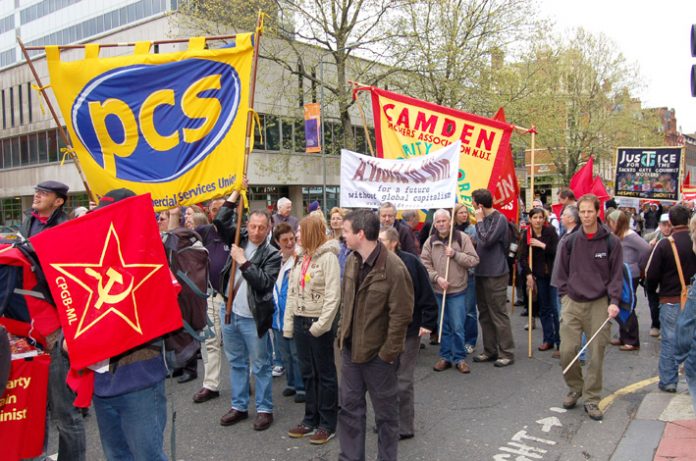
AHEAD of officially assuming his post on Sunday, Israel’s incoming ‘Defence’ Minister Amir Peretz was anxious to carry on the mission of his predecessor, Shaul Mofaz.
He gave the go-ahead to a new Israeli extra-judicial killing, which missed its target and instead killed five Palestinians, including four of the same family, in Gaza Friday, a failed assassination that was immediately condemned by both the Palestinian presidency and government.
The Israeli Occupation Forces (IOF) launched an air strike and fired three missiles at a playing field, claiming it was a training camp, scattering the body parts of five Palestinians and leaving pools of blood in the field just yards away from the home of Moumtaz Doughmush, a top commander in the Popular Resistance Committees (PRC), who was not at the scene, but his brother and three cousins were, hospital officials said.
The bodies of Joma’ah, Mahmoud, Hamadah and Wahid Doughmush, and Khaled Deib were shredded to pieces. Four Palestinians were also seriously wounded.
The strike was approved by Peretz, who held a series of consultations with senior security officials and gave the go-ahead, in the Labour leader’s first operational decision since assuming office, Israeli public radio reported.
Both the Palestinian presidency and government condemned the Israeli failed extra-judicial killing.
The Palestinian government condemned the Israeli “assassination operation.”
‘It is the first act by the new government. The attack is proof that this government intends to escalate its crimes against the Palestinian people and hamper the Palestinian government,’ said spokesman Ghazi Hamad.
Palestinian President Mahmud Abbas’ spokesman, Nabil Abu Rudeinah, hit out at what he described as the ‘ongoing Israeli policy of assassinations’ and urged the main diplomatic players ‘to immediately intervene to put a stop to the Israeli escalation.’
He added that ‘Such an Israeli escalation won’t help efforts to restore calm in the region.’
Chief Palestinian negotiator, Saeb Erekat, condemned the Israeli raid adding that the Israeli assassination is programmed and comes within the context of the continued Israeli aggression against the Palestinian people.
Erekat warned that this Israeli aggressive policy, the continued building of Israel’s Apartheid Wall on the occupied West Bank, expanding the Israeli settlements and dictating a unilateral solution by Israel would lead to ‘expanding the circle of bloody violence in the region.’
An Israeli military spokeswoman confirmed that an Israeli aircraft had fired missiles at a ‘training base’ in the Tal al-Hawa neighbourhood of the Gaza city, but a PRC spokesman said the target was a playing field and was abandoned as a training area three months ago.
Separately in the West Bank on Friday, the IOF shot dead with a bullet in the chest Mohammad al-Kotob, 19, who was among unarmed teenager protesters throwing stones at IOF troops conducting detentions during a raid into the Rafidiyah neighbourhood of Nablus in northern West Bank.
Meanwhile 30 IOF military vehicles and bulldozers were storming into the nearby refugee camp of Balata, declaring a curfew, opening sporadic gunfire at the start of a detention spree. At least eight Palestinians were wounded.
A day earlier, IOF troops shot dead Palestinian taxi driver, Zakaria Daraghmeh, 37, at a checkpoint between Jenin and Nablus in the northern West Bank.
B’Tselem, the Israeli Information Centre for Human Rights in the Occupied Territories, demanded the IOF military police launch an investigation into the incident, saying Daraghmeh was unarmed and posed no threat to the soldiers.
Earlier in the week, IOF troops shot dead a woman, 45-year-old Itaf Zalat, inside her home after soldiers opened fire at her house the northern West Bank village of Thinnaba, near Tulkarem. Her two daughters were also injured during the operation.
A B’Tselem press release issued after her killing said: ‘The circumstances under which ‘Itaf Zalat, a 44-year old woman, was killed in Tulkarem last night, raise the grave suspicion that Israeli security forces acted as if they were conducting an assassination rather than an arrest operation.’
‘Such behaviour constitutes a blatant violation of the principles of International Humanitarian Law,’ B’Tselem said, adding that an IOF apology is not enough: ‘B’Tselem has yet to complete its investigation into the incident. However, its initial findings indicate a clear similarity between the security forces’ behaviour in this incident and those in past arrest operations in which innocent civilians were killed.’
The Israeli ‘soldiers used lethal force without being in any life threatening situation, demonstrating a pattern of indifference to the safety of Palestinian civilians,’ it added.
IOF soldiers killed in April 37 Palestinians, including six children, in fourteen assassination attacks. 182 Palestinians and five international peace activists were also injured in the Israeli strikes and attacks, a monthly report by the Palestine Liberation Organisation (PLO) said.
A three-year-old Palestinian girl was killed at an Israeli checkpoint in the West Bank city of Ramallah, while accompanying her mother and three brothers to pay a visit to her detained father in the Israeli jail of Nafha, the mother told the Palestinian official news agency, WAFA, on April 29.
312 more were detained, including 19 children and the IOF troops used 18 houses as military posts and monitoring towers in April.
According to the report, the number of Palestinians the IOF killed since 29/9/200 until 30/4/2006 totalled 4050, including 790 children, 269 women, 346 members of the Palestinian National Authority (PNA) police and security forces, nine Palestinian journalists, 220 athletes and nine international peace activists.
408 Palestinians were assassinated, 137 died at IOF checkpoints while being transferred to hospitals, and 58 were killed by the illegal Jewish settlers.
From Early 2004 until 1/5/2006, 157 Palestinians were killed in the West Bank, B’Tselem said in a report, at least 35 of them were civilians and bystanders, and 54 defined as ‘wanted’ by the IOF.